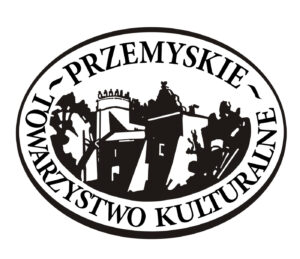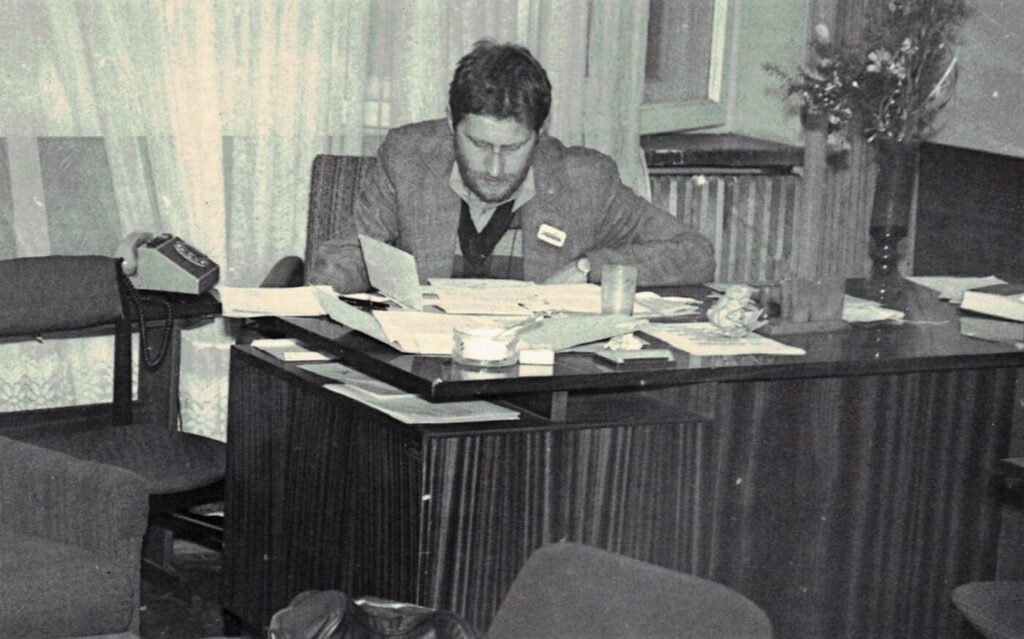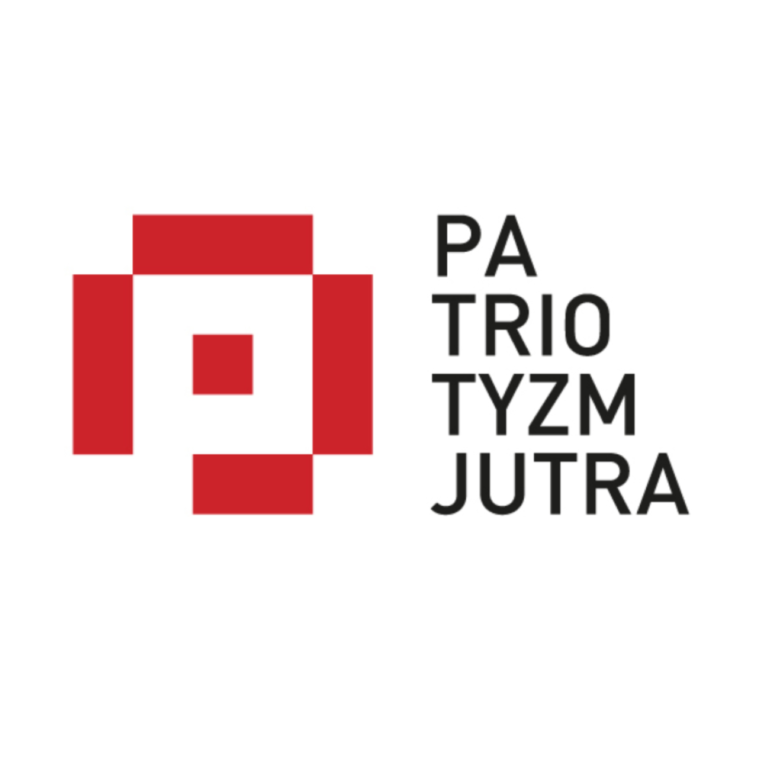
FROM THE ENCYCLOPEDIA OF SOLIDARITY IPN
Jan Antoni Musial, born 1 I 1948 in Czestochowa. Graduate of the Jagiellonian University in Cracow, Institute of Polish Studies (1972), PhD (2006). 1973-1981 journalist for "Nowiny Rzeszowskie" and "Konfrontacja".
https://encysol.pl/es/encyklopedia/biogramy/17734,Musial-Jan-Antoni.html?search=46412807476
Already in my first year of studies, in March 1968, it came to me to literally collide with politics - during a student protest response to a demonstration of the power of the then authorities, when we were walking to a rally in front of the Jagiellonian University's Collegium Novum and at the exit of Lipcowy Manifesto Street (today's Pilsudski Street) to Planty, we were blocked by a double row of Zomovniks, banging their batons on our shields to scare us and turn us back. Which they succeeded in doing, because, walking at the head of this improvised procession, we jumped hurriedly through the gate of one of the buildings of the Krakow seminary to avoid feeling those batons on our backs; the rest of the students retreated in panic under the "Sokol." Reflection and questions about the nature of the incident came later, in heated conversations inside and outside the dormitory.
A side thread of that reflection was the unexpected presence among us of "snitches," that is, informers of the political police - the MO Security Service. At that time, no one had ever denounced me by name, and I was not questioned by them, but when this happened soon, after more than two years, one of the first questions from the secret police was about my participation in the March riots. It happened on December 17, 1970, and the day before I took part in a student demonstration I had co-organized in the Cracow Market Square, at the Adam Mickiewicz monument, after which, lured out of the dormitory ("Żaczek") by its manager, Jan Maurer, along with two fellow residents, I was apprehended by the secret police and taken to their headquarters at Plac Wolności. About the further turns of that incident with freedom not only in name, but most realistically acute, I have already mentioned in the previous part of my memoirs. Circles of militia informers will henceforth become an inseparable part of the rag of my life. To this experience I want to revisit from a distance of more than half a century.
Three days earlier, one of those lured out, Andrzej Marchewka, a first-year law student at the Jagiellonian University, and for Comrade Olszak, drawing up an extract from the report there, a secret collaborator with the pseudonym Ace reported to the officer who had him "in contact" that "on 13. XII. 70 at about 7 p.m. in the hall of the DS Żaczek dormitory. A poster with political content was [original spelling] posted. On the board depicting a graph of the production growth curve, a man was depicted pushing uphill the zloty. At the point where this zloty was, the production curve was falling vertically downward, underneath was the caption: 'Push even further'. [...] The man who was pushing this [original inflection] zloty had the head of (photo) W. Gomulka. When I came [original spelling] to room 266, then Jan Musial, who lives with me, said that he was the one who put up the poster. To my question why? - he said that he made a little political joke. [At this conversation, Stanislaw Romankiewicz was still in the room. The posters that hung in the hall were photographed by some man (most likely from Russian Studies)."
What dovetails today with that denunciation excerpt and a related circumstance is the puzzling fact that the dormitory manager had docked the room, already occupied by close-knit fourth-year students, a polonist and a mathematician - a first-year lawyer in spe. Today, however, it is known that Jan Maurer was also "in contact" with the police at the time, and was particularly sensitized by the SS officer in charge of him to Romankiewicz, who had contacts with Adam Macedonski, who had long been followed by the SB. The web with which this service entangled the opposition circles already active, but - predictably - also those that might just be starting to act, was extensive, with a noticeable upward trend.
TW "Ace" was, of course, excluded from any further hopelessness of the communists' sense of humor (although, to keep up appearances, he was still in it). Two of his victims, after spending the night in a temporary detention center on Czarnowiejska Street, first stood before the prosecutor (in my case, it was Kazimierz Musiał, the vice-prosecutor of the Cracow Provincial Prosecutor's Office, which was ironic, as we had no family ties), and then, with his decision on temporary arrest, sent back on December 19 to the Provincial Detention Center - the notorious prison on Monteluppich Street. The qualification of the "little political prank" was serious: "disseminating false news likely to cause serious harm to the Polish People's Republic [that is,] committing a crime under Articles 271, 273 and 280 of the Criminal Code," with the announcement that this "preventive measure [...] will be revoked if there is no renewal or indictment by January 18, 1971." However, two days later, the then-political decision-maker and overseer of the people's judiciary, the Central Committee of the Polish United Workers' Party - in view of the magnitude of the massacre on the Coast and its worldwide repercussions - decided, formally as a shortcut, to exclude students from the crackdown on the workers, and when this directive reached Krakow, December 23, I found myself unexpectedly on Montelupich Street outside the prison wall as a consequence of an immediate "release order" with a certificate of the same in hand, obliged "to report to the MO Headquarters at my place of residence [i.e., in Czestochowa] no later than 26.12.1970."
Having returned to Cracow after the Christmas break, I now had to endure, beginning in January 1971, monthly strenuous, including physical, harassment by the SS, with the undisguised intention of scouting me into the ranks of their informers from as early as April. In one of the later official memos preserved in the IPN collection, Lt. Leszek Olter reported to Major Stanislaw Wysokiński, deputy head of Department III of the Rzeszow CID: "A prophylactic interview was conducted with him [Musial], during which 'he was very cautious and reticent, you could see that he weighed every word appropriately. He realizes that he will have to face consequences for his actions [punctuation and original phraseology] and is fully prepared for this.' But 'on the other hand, he believes that these will be his only and last contacts with our apparatus'. He stated that 'from his side we have nothing to count on for help' after it was hinted to him what kind of help he expects from the SB society (interview conducted on 23.04.1971)." It is not so much the personal as the social dimension of this exchange of words that is worth emphasizing here: this political police brazenly created itself as a social partner - elite and, in the axiomatic belief of its due uniqueness, towering over society. The post-communist politicians raised by it in the next generation give constant expression to such insolence. Its genesis can only be traced to Oprichnina and later varieties of this Turanian formation - fundamentally incompatible with our political heritage.
On August 31 of that year, we already lege artis The provincial prosecutor's office in Cracow issued a decision to discontinue the investigation in the proceedings in question (II 1 Ds 254/70) "in view of the negligible degree of social danger of the act (Article 26 of the Criminal Code)." It was signed by the same deputy prosecutor, justifying with a copper brow that "the problem in the present case is not the question of the sufficiency and persuasiveness of the evidence, but the degree of social harm of the suspects' acts. The increase in the price of foodstuffs introduced on 13.XII.70. [intetrpunctuation of original] outraged public opinion and caused it to react in more or less drastic forms. One form of this reaction was the behavior of Andrzej Marchewka, Jan Musial and Stanislaw Romankiewicz. The satirical leaflet and thunderous shouts at the monument to A. Mickiewicz turned out to be nothing more than a symptom of youthful exaltation with negligible social danger." What was "considerable" a few months ago has become "negligible." The prosecutor's inconsistency obviously found justification not in a belated reaction of conscience, but in the cynically applied "wisdom of the stage." After all, we find this new-fangled logic still present in the post-communist mainstream media.
Pursuant to Article 14 of the Code of Criminal Procedure, the rector of the Jagiellonian University, Prof. Dr. Mieczyslaw Karas, was notified of the decision discontinuing the investigation, but he did not put the letter aside ad acta, as ordinary business pragmatics would dictate, but triggered the university's extraordinary disciplinary procedure. He didn't have to, but he triggered it, thus demonstrating the ideological vigilance well seen at the summits of power; all the more so because it involved one of his scientific protégés, also a Polish scholar. On his behalf, the initiative was taken by the pro-rector for teaching affairs, Prof. Dr. Józef Buszko, obliging Associate Professor Janusz Homplewicz, the disciplinary ombudsman for student affairs, to initiate the appropriate "investigation" against the aforementioned "accused of disturbing public order, i.e., of an act unworthy of a UJ student." That the "defendants" had already been validly "discontinued" seemed not to matter here.
The proceedings, which began on September 28, ended on November 19 with a "punishment of the rector's admonition." Already without a paper qualification, to say the least, my scholarship was quietly reduced, which may have been a grassroots display of vigilance on the part of the Bursar's Office (there was no point in protesting this harassment in my final year of study). Under the legal façade of the People's Republic of Poland, the principle of covert, manual application of the law and its unpunished subjection to discretionary political supervision, with overt Soviet provenance, flourished at many levels of institutional practice; today 'a rebours attempting a comeback, for example, in the "Neuman Doctrine."
Having gotten out of the sight of the Cracow esbice, I deluded myself that - definitively. Dated March 30, 1981, an official memo, written by an anonymous archivist of the MO Regional Office in Rzeszow, marked "Secret spec. meaning. Ex. poj." left no illusions about the vigilant continuity of this surveillance: "On the basis of the archival mat[erials] of the investigation and evidenci[ionary] ques[ionary] No. 4713/III received from the Department "C" of the KWMO in Cracow, it was concluded that J. Musiał, while a fourth-year student at the Faculty of Philology of the Jagiellonian University in December 1970, participated in the preparation and distribution of posters and leaflets with hostile political content. He was charged with a crime under Article 271 par. 1 KK, and the criminal proceedings were later dismissed [spelling of original] on the basis of Article 27 par. 1 KK. A prophylactic interview was conducted with the named in 1971. He was the first to establish very close contact with the founding committee of the NSZZ "Solidarity" in Rzeszow as a journalist of the PZPR daily "Nowiny". He participated in the work of the strike committee during the occupation strike of WSK Rzeszow on 3.10.1980. He helped edit strike documents. During the general meeting of the Rzeszow Branch of the Association of Journalists, he criticized the role of the PZPR Provincial Committee as a censor. In the compilation of the communiqué from that meeting, the comment about the SDP's recognition of the PZPR's leadership role was omitted. With his speeches, Musial influenced the breakup of the "Nowin" collective. He took an active part in the occupation strike at the former WRZZ building in Rzeszow [original syntax]. He became editor of the strike newspaper from the position of which he spoke hostilely against the PZPR. During the strike period, he held meetings in his apartment with U.S. consular employees and KSS KOR activists. In a certain situation, he could undertake hostile activity against the vital interests of the People's Republic of Poland."
The IPN's files on me from the Rzeszow period are the richest - above all in denunciations of secret collaborators of the SB, especially from December 13, 1981, when "[the remaining person of interest] was scheduled for internment under Operation 'Jodła' [and] avoided detention because he had been in hiding since the introduction of martial law." The dogs set off in pursuit:
"From single-source information from TW, alias Kwiatkowski, reg. no. 14149, it appears that after 13/12/1981, the above-mentioned, together with Jozef Baran, an activist of the KSS KOR in Cracow (reg. no. PROO-3125), did not cease their trade union activities and was a co-author of two leaflets calling for disobedience to the decisions of the state authorities. In this situation, the case of operational elaboration reg. no. 15763, cryptonym "Journalist" was reclassified to the case of operational elaboration crypt. "Writer" reg. no. 17313". In the hierarchy of professions parading as writers, this was undoubtedly a promotion. However, what guided the grammatically undereducated officers in such casual handling of cryptic terms in the field of medio- and even literary studies, I still do not know to this day. The seven-page executive plan for this SOR (case of operational dissection), however, already did not inspire even linguistic jokes.
After outlining the "operational situation," Lt. A. Bogusz, tasked with carrying out the plan, and supervised by Lt. J. Klader, head of Section III, then specified the "directions of operational activities" in nine points, starting with the recognition of the wanted man's inclinations and habits, through his family, residential and working environments, of course, "related illegal structures to the figurehead," to "possible links with diversion centers in the West" - in order to "capture or recruit the figurehead to cooperate with S.B.". One denial, therefore, was not enough. The net was cast widely - "in cooperation with Divisions V of the KWMO Przemyśl, Częstochowa, Krakow," for "according to information from tw ps. Lemke (reg. no. RZO16038) in February this year. J. Musiał was seen in Krakow" precisely. They created the conterfekt of the pursued person not only on the basis of established facts, but also - discouraging to him - hypotheses that, for example, he is "a man who makes attempts at conspiratorial activity in order to attract the attention of S.B., to be arrested and to be a hero in the eyes of his colleagues among the leading activists of MKR Rzeszow." This was an exceptionally perfidious fake news (who will help the mythomaniac?), although at the time the term was not yet in public circulation. But this type of endeavor, undertaken to "compromise and weaken the figurehead's ties with the environment that maintains contacts and is subject to his influence," was so important that its execution was taken on by Section III supervisor Lt. Andrzej Czerwiński, deputy head of Department V.
The seventeen-point list of "operational activities," however, focused on specifics: identifying not only the figurant's family, but also neighbors and all associates of the figurant "for the purpose of subjecting them to preliminary operational reworking," setting up wiretaps "to family members and contacts of the figurant who have private telephones," "randomly inspecting ambulances," "making determinations under what circumstances [the figurant] may lose his journalistic privileges" (here with the operational assistance of the named K.O. "Knight"), and even "in consultation with the WOP's Stewardship Board, to conduct active crackdowns on persons crossing the border and staying in the border zone." The latter was to be carried out by the "Head of the Department himself, Lt. Col. Stanislaw Sledziona," who ultimately approved the entire plan. I don't think he envisaged the escape of the pursuer to Soviet Ukraine or brotherly, socialist Czechoslovakia, but who knows? Unfortunately, all this was really happening, and the wounds inflicted as a result of the detailed actions some could not heal for a long time.
In the "list of persons wanted on an extraordinary basis for internment" (KR-IV-8663/81), drawn up within the framework of the Object Case "Renaissance" (no. 42220) by Capt. M. Szczepanowski, head of the records and searches section of the Criminal Department of the Military Police Headquarters in Gdansk on December 27, 1981, I appear under number 119. The head of Department IV of the Provincial Headquarters of the Military Police in Przemyśl, in a reminder dated September 14, 1982, addressed subordinate officers: "Since 12.12.1981, Jan Musiał, scheduled for internment (...) a journalist by profession, former activist of the MKR NSZZ 'Solidarity' in Rzeszów, remains in hiding. (...) It has been established that he maintains contacts with priests in the area and may benefit from their help in hiding." The aforementioned co-author of the abundantly quoted executive plan for the SOR "Writer," Lt. A. Czerwinski, in closing the case on November 10, 1982, after aseffectively stating that "on 4.11.1982 the regional daily Nowiny reported that [he] had been detained by the SB (YBO3)," reasoned:
"With the detained on 27.10.1982, hiding since the introduction of martial law, the figurehead of the case Ob. Musiał Jan (reg. no. RZO15763), former editor-in-chief of the Information Bulletin entitled "Solidarność Rzeszowska" (XOBC). "Solidarność Rzeszowska" (XOBC), published by the former MKR NSZZ "Solidarność" in Rzeszów (X600-RZRP), had a cautionary conversation during which the named explained that the reason for his hiding was the fear of internment, which would prevent him from taking treatment for a chronic skin disease. He stated that he was hiding with acquaintances of people whose names and addresses he did not disclose. His intention, he said, was to hide until martial law was revoked. He declared that he had not engaged in conspiratorial activity since 13/12/1981, and drew up a written declaration pledging not to carry out activities in violation of martial law. A search conducted at the figure's residence yielded a negative result. [Taking into account the above, the case of operational crackdown crypt. "Writer" reg. no. RZO17313 was terminated and deposited in the archives of Department "C" of the local CID." An anonymous addendum to the "request for termination of SOR" further supplemented this explanation: "The named was released home, as the reasons for which he was to be interned have currently ceased." The principle of "stage wisdom" once again made itself known.
The further 1980s "enrich" my archival record questionnaire only with a stipulation of reservation of departure abroad dated August 13, 1986, on the grounds that the applicant "may take actions against the basic interests of the People's Republic of Poland" (but with a date hinged "until 15.08.1988") and a notation in the documentation of Department I of Bureau "C" that the archiving was terminated on 4.07.1989 "due to the election of him [i.e., me] as a senator of the People's Republic of Poland" with the prospect of "the year of lacking 1995" and "the year of lacking mic[ilm] 2018." Consciously, however, I had previously applied to the Institute of National Remembrance for an archival search under Article 30, paragraph 2, of the law on its establishment, and on July 16, 2003, I received from it certificate No. 223/03 that I was a "victim within the meaning of Article 6 of the aforementioned law," which gave me the statutory title to look into my files.
The search is not definitively closed, however, because by Decision No. 168/07 of August 9, 2007, the IPN refused to "provide me with the names and personal data of the persons [delators] on the grounds that [they] cannot be unambiguously identified on the basis of the documents of the state security body in question, which are in the archival collection of the Institute of National Remembrance - Commission for the Prosecution of Crimes against the Polish Nation." The denial applies to informers hidden under the following pseudonyms: K.s. "E.W.", ob. "J.K.", K.o. "J.A.", TW "Krak", TW "Barbara", K.s. "M.H.", TW "Bartek", TW "Anker", K.o. "A.R", R.B, Jerzy D., TW "Janusz", TW "Atos", "Felek", TW "Ogień", TW "Cycero". Is it still worth crushing copies for their disclosure?
A partial answer to this question is a publishing incident that happened to me in 2019. In the book Resort children. Politicians by Dorota Kania, Jerzy Targalski and Maciej Marosz, published by Fronda Publishing House, in Part III Aides 1. Resort justice. Alexander Bentkowski - PSL lawyer. On page 545, the second paragraph begins with the sentence: "On another occasion, 'Arnold' relayed that he was approached by a liaison of Jan Musiał, a former journalist for 'Nowiny Rzeszowskie,' for legal advice. The TW relayed that Musial was hiding from the communist authorities, most likely in the Krosno province." This is followed by footnote 51, which refers to the file of the Institute of National Remembrance with the signature IPN BU 00751/227 - to an official note of a meeting held on September 24, 1982 by SB Lieutenant J. Kruczek with TW "Arnold."
Unfortunately, the excerpt from the book quoted above does not agree extenso with the content of the memo contained in the IPN files, because the SB officer drafting it put the word "liaison officer" in quotation marks, which obviously changes the meaning of the first quoted sentence of the book from ambiguous to unambiguous, suggesting just so my supposed connection with the SB secret collaborator "Arnold." Adding spice to this media confusion is the fact that Aleksander Bentkowski at the time simultaneously served as a legal advisor to both the Rzeszow Solidarity movement and the Przemyśl Bishop's Curia. Of course, I did not send any liaison to this Rzeszow lawyer in 1982, and I had no direct or indirect contact with him in the 1980s.
My private search led to the discovery that, yes, a prominent prelate of that curia had consulted Bentkowski as a "Solidarity" advisor about me; after all, I was a barely captured "Solidarity" editor who was to be taken in by the Church. The circle of insinuation closed and clarified for me. However, the publisher left unanswered my demand to post a correction so that this clarification would also reach a wider audience. I no longer have the health to pursue it in court. History, therefore, can still catch us unprepared even after half a century, and it is good to remember that.
.











